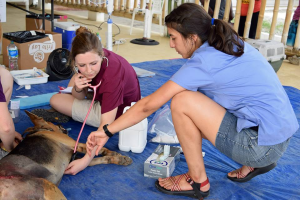-
About
- Leadership & Faculty
- News & Events
-
Academics
- Graduate
- Advanced Clinical Training
- Continuing Education
- Academic Departments
- Academic Offices
- Simulation Experiences
-
Student Life
- Offices
-
Research
-
Hospitals & Clinics
- Emergency Care
- Hospital Services
-
Community Outreach
- Volunteer
IVM Curriculum
Core Courses
The IVM core course, which all veterinary students take in their first year, introduces global issues in the veterinary profession.
This course reviews the roles of veterinarians and animals in various environmental, economic and demographic contexts. The ecological foundations of the major animal production systems are explained. Disease deterrents to production and commerce are reviewed. The structure and function of animal health services are correlated with economic and social structures. Emphasis is placed on the development of socially, environmentally, technically and economically sound solutions to livestock- and wildlife-related problems in the developing world.
Every lecture includes a “Disease of the Day”, in which a disease of international importance is introduced and briefly described. These include:
- Rabies
- Bovine Spongiform Encephalopathy
- High Pathogenic Avian Influenza
- Peste de Petits Ruminants
- Foot and Mouth Disease
- Tuberculosis
- Anthrax
- Leptospirosis
- Ebola
- Rinderpest
- Contagious Bovine Pleuropneumonia
IVM Focused Electives
At the end of the third year and during the fourth year, advanced and clinically-oriented electives are available both on and off campus for students with an interest in IVM.
Advanced IVM Elective
The Advanced IVM Elective is a short course for third and fourth-year students.* This elective course builds upon the IVM Core Course, Summer Research Program, and IVM Forums, and is targeted towards students with a specific interest in applying their veterinary skills in an international setting. The emphasis is on practical technical and communication skills that contribute to increased effectiveness in new and challenging environments. Approximately half of the time is devoted to didactic presentation of in-depth material on the key components of IVM. The other half of the allotted time consists of practical work, team-based problem solving and field case discussions.
*When taken in the third year, the course is called the 'Advanced IVM Selective'.
Clinically-Oriented Electives
The fourth-year International Clinical Rotations elective provides opportunities to gain clinical experience in international settings. The elective may be part of an international development assistance program or arranged independently by the student.
Examples of elective placement organizations include:
- Project Samana, Dominican Republic
- Belize Wildlife & Referral Clinic and Wildlife Institute
- World Vets, Honduras
- Darwin Animal Doctors, Galapagos
- Ocean Park, Hong Kong
- Abu Dhabi Falcon Hospital
- Nuñoa Project, Nuñoa region of Peru
- Boyd Orr Centre for Population and Ecosystem Health, University of Glasgow, Scotland
- Isla Nena Clinica de Animales, Vieques, Puerto Rico
IVM Focused Selectives
Selective courses are designed to allow students to personalize their education and focus on their areas of interest. Students complete a minimum of 3 selective credits during the first five semesters of the D.V.M. program. IVM selective opportunities include:
- Animals and Public Policy
- Issues in Wildlife Policy
- Conservation Medicine
- Envirovet
- International Veterinary Medicine
- Project Preparation and Implementation
- International Development
- Personal Development and Community Service
- Introduction to Geographic Information Systems
- Regular Medicine and Public Health
- Harvard School of Public Health
- Massachusetts Department of Food and Agriculture
- USDA Veterinary Services
- Research
- Research in Veterinary Medicine/Scientific Methods
- Livestock
- Backyard poultry
